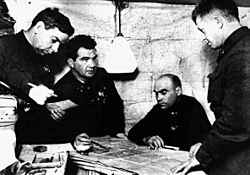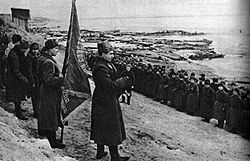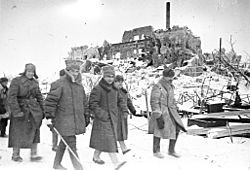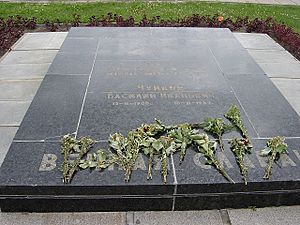Vasily Chuikov facts for kids
Quick facts for kids
Marshal of the Soviet Union
Vasily Ivanovich Chuikov
|
|
|---|---|
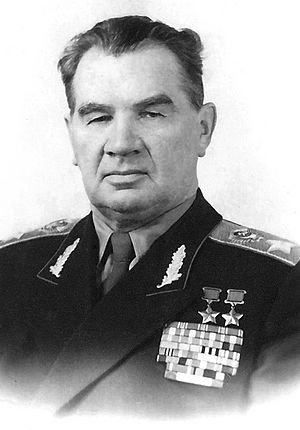 |
|
| Native name |
Василий Иванович Чуйков
|
| Nickname(s) | "The Man of Iron Will" "The Stone" |
| Born | 12 February 1900 Serebryanye Prudy, Tula Governorate, Russian Empire |
| Died | 18 March 1982 (aged 82) Moscow, Russian SFSR, Soviet Union |
| Place of burial |
Mamayev Kurgan, Volgograd, Russia
|
| Allegiance | |
| Years of service | 1917–1972 |
| Rank | |
| Commands held | 4th Army 64th Army 62nd Army 8th Guards Army Group of Soviet Forces in Germany Kiev Military District |
| Battles/wars | Russian Civil War
|
| Awards | Twice Hero of the Soviet Union Distinguished Service Cross (United States) |
| Other work | 1961 until his death, he was a member of the Central Committee of the Communist Party of the Soviet Union |
Vasily Ivanovich Chuikov (Russian: Васи́лий Ива́нович Чуйко́в; 12 February 1900 – 18 March 1982) was a famous Soviet military leader. He became a Marshal of the Soviet Union, which is a very high military rank. He is most famous for leading the 62nd Army during the fierce Battle of Stalingrad in World War II.
Vasily Chuikov was born into a farming family near Tula. He started working in a factory when he was 12 years old. After the Russian Revolution in 1917, he joined the Red Army. He showed great bravery during the Russian Civil War.
After studying at the Frunze Military Academy, Chuikov worked as a military expert and spy in China. When World War II began, he led the 4th Army during the Soviet invasion of Poland. He also commanded the 9th Army in the Winter War against Finland. In 1940, he went back to China to help Chiang Kai-shek fight against Japan.
In March 1942, Chuikov was called back to the Soviet Union to help defend against the German invasion. By September, he was put in charge of the 62nd Army. His job was to defend the city of Stalingrad at all costs. He developed a special tactic called "hugging the enemy." This meant keeping his soldiers very close to the German lines. This made it hard for German planes to bomb Soviet positions without hitting their own troops.
By November 1942, German forces had taken most of Stalingrad. But Chuikov's 62nd Army kept fighting. In late November, Soviet forces launched a huge counter-attack. This surrounded the German 6th Army, forcing them to surrender in early 1943. After Stalingrad, Chuikov led his forces through Poland and eventually to Berlin. He personally accepted the surrender of German forces in Berlin on May 2, 1945.
After the war, Chuikov held many important positions. He was the head of Soviet forces in Germany and later led the Soviet Ground Forces. He was awarded the title Hero of the Soviet Union twice for his bravery. In 1955, he became a Marshal of the Soviet Union. He passed away in 1982 and was buried at the Stalingrad memorial at Mamayev Kurgan. This place was a major battle site during the war.
Contents
Early Life and Joining the Army
Vasily Chuikov was born in 1900 in a small village called Serebryanye Prudy. This village is south of Moscow. He was the eighth of 12 children in his family. When he was 12, he left school and his home. He went to work in a factory in Saint Petersburg. He made parts for cavalry officers. All of Chuikov's brothers became soldiers. They all fought in the Russian Civil War.
During the Russian Revolution of 1917, Chuikov lost his job. Later that year, his older brother helped him join the Red Guards. In 1918, he officially joined the Red Army. In October 1918, he was sent to fight the White Army. He became a deputy company commander. In 1919, he became the commander of the 40th Regiment. This regiment fought against the White Army in Siberia.
Chuikov was very brave during the Civil War. He received two awards for his courage. These were called the Order of the Red Banner. He was wounded four times. One wound in his left arm in 1920 caused him problems for the rest of his life. It led to partial paralysis and later to a serious infection. This infection eventually caused his death in 1982.
Between Wars: Military Advisor in China
After the Civil War, Chuikov continued his education. He studied at the Frunze Military Academy and graduated in 1925. Because he was a great student, he stayed another year. He studied Chinese language and history. In 1926, Chuikov visited many cities in China as part of a Soviet group.
In 1927, he became a military advisor in China. He traveled a lot in southern China. He learned to speak Chinese very well. He also gained a deep understanding of Chinese politics and culture. In 1929, he had to leave China. This was because the Soviet Union ended its diplomatic relations with China. He then worked in military intelligence in the Soviet Far East. He helped in talks that gave the Soviet Union control of the China Eastern Railway back.
World War II Begins: Poland, Finland, and China
In 1939, Chuikov led the 4th Army during the Soviet invasion of Poland. In 1940, he commanded the 9th Army in the Winter War against Finland.
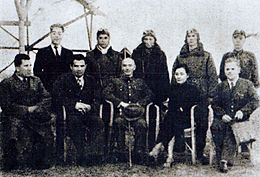
In December 1940, Chuikov was sent back to China. He became the main Soviet military advisor to Chiang Kai-shek. Chiang Kai-shek was the leader of the Nationalist government in China. Before he left, Joseph Stalin told him to make sure China kept fighting Japan. This was so Japan would not attack the Soviet Union from the east. Chuikov brought many Soviet weapons to China. These included tanks, artillery, and planes.
In 1941, the Nationalists attacked the Chinese Communists. Chuikov was criticized for not stopping this. But he followed Stalin's orders to keep supporting the Nationalists against Japan. He helped Chiang Kai-shek in the Second Battle of Changsha. His advice helped the Chinese forces succeed. In March 1942, he was called back to the Soviet Union. By then, the Soviet Union was fighting Germany.
The Battle of Stalingrad
On September 11, 1942, General Chuikov was given a very important job. He was made commander of the 62nd Army. His mission was to defend the city of Stalingrad. The city was on the western bank of the Volga River. German forces were trying to surround the city. Chuikov arrived in Stalingrad and set up his command post. He immediately started preparing the city's defense.
Chuikov made sure his soldiers were determined. He followed Joseph Stalin's order "not one step back." This helped the 62nd Army defend the city against very strong attacks. He also developed a key tactic called "hugging the enemy." This meant Soviet soldiers stayed very close to German soldiers. This made it dangerous for German planes to drop bombs. They could not attack Soviet positions without hitting their own troops.
Chuikov saw how the Germans used their tanks and planes to quickly move across open land. So, he drew the German tank units into the ruined city. In the rubble, their tanks moved slowly. Soviet soldiers could then attack them with Molotov cocktails and anti-tank rifles. This tactic made the German air force less effective.
The strong defense of Stalingrad by the 62nd Army slowed the German advance. It forced the Germans to bring more troops into the city. By mid-November, German forces had taken most of the city. Chuikov and his remaining defenders were pushed back to the Volga River.
On November 19, 1942, Soviet forces launched a huge counter-attack. This attack surrounded the German Sixth Army. On November 22, Chuikov's 62nd Army also began to attack. They recaptured parts of the city. This stopped German forces from leaving Stalingrad to fight elsewhere. The German Sixth Army surrendered on January 31, 1943.
Pushing Towards Berlin
After the victory at Stalingrad, the 62nd Army was renamed the Soviet 8th Guards Army. Chuikov then led the 8th Guards Army through Poland. They were part of the 1st Belorussian Front. During the Vistula–Oder offensive, Chuikov's troops broke through German defenses. They helped free the Majdanek concentration camp near Lublin.
The 8th Guards Army also freed the city of Łódź. They captured the strong city of Poznan. They then crossed the Oder River and fought for two months to hold their position. Finally, they led the Soviet attack that captured Berlin. This happened in April and May 1945.
Chuikov's army moved very quickly through Poland. Sometimes, they advanced over 40 miles in a single day. On May 1, 1945, Chuikov was in central Berlin. He was the first Allied officer to learn about Adolf Hitler's suicide. A German general came to Chuikov's headquarters with a white flag. He wanted to surrender on better terms for the Germans. But Chuikov refused any special terms. On May 2, he accepted the complete surrender of Berlin's forces.
Later Life and Legacy
After the war, Chuikov continued to lead the 8th Guards Army in Germany. From 1949 to 1953, he was the Commander-in-Chief of the Group of Soviet Forces in Germany. In 1953, he became commander of the Kiev Military District. On March 11, 1955, he was promoted to Marshal of the Soviet Union.
From 1960 to 1964, he was the Commander-in-Chief of the Soviet Ground Forces. He also led the Soviet Civil Defense from 1961 until he retired in 1972. From 1961 until his death, he was a member of the Central Committee of the Communist Party of the Soviet Union. In 1969, Chuikov went to the funeral of Dwight D. Eisenhower.
Chuikov was a main advisor for the design of The Motherland Calls memorial. This huge statue honors the Battle of Stalingrad. He was buried there after he died at age 82. A small paper with a prayer was found among his things after he passed away. It said: "Oh, the One who can turn night into day and earth into a flower garden. Make every difficult thing easy for me. And help me."
Books by Vasily Chuikov
- The Beginning of the Road: The Story of the Battle for Stalingrad, London, 1963.
- Mission to China: Memoirs of a Soviet Military Adviser to Chiang Kaishek, 2003.
- The End of the Third Reich, 1978.
Awards and Honors
Soviet Union
| Hero of the Soviet Union, twice (1944, 1945) | |
| Order of Lenin, nine times | |
| Order of the October Revolution | |
| Order of the Red Banner, four times | |
| Order of Suvorov, 1st class, three times | |
| Order of the Red Star | |
| Medal "For the Defence of Stalingrad" | |
| Medal "For the Capture of Berlin" | |
| Medal "For the Victory over Germany in the Great Patriotic War 1941–1945" |
Other Countries
| Patriotic Order of Merit in gold, twice (East Germany) | |
| Order of Sukhbaatar (Mongolian People's Republic) | |
| Grand Cross of the Virtuti Militari (Poland) | |
| Order of the Cloud and Banner with Special Grand Cordon (Republic of China) | |
| Distinguished Service Cross (United States) |
See also
 In Spanish: Vasili Chuikov para niños
In Spanish: Vasili Chuikov para niños
- Battle of Berezina


